EEC英语Unit 1-5(-初二下)
EEC英语八年下英语单词UNIT1-4

初二下册英语知识点unit1-5(Word版)

run out n. 刀,餐刀
cut off 切除
blood [blʌd] n. 血
mean [mi:n] v. 意味着,意思是,意欲
get out of 离开,从… 出来
importance [ɪmˈpɔ:tns] n. 重要性
30. make a decision 做出决定
31. get into trouble 造成麻烦
32. right away 立刻;马上
33. because of 由于
34. get out of 离开;从……出来
35. keep on doing sth. 继续或坚持做某事
36. put a bandage on sth. 用绷带包扎
knee [ni:] n. 膝盖
nosebleed [ˈnəʊzbli:d] n. 鼻出血
breathe [bri:ð] v. 呼吸
sunburned [ˈsʌnbɜ:nd] adj. 晒伤的
ourselves [ɑ:ˈselvz] pron. 我们自己(we的反身代词)
climber [ˈklaɪmə(r)] n. 登山者
raise [reɪz] v. 抬起,举起,筹集,征集
alone [əˈləun] adv. 独自地,孤独地
repair [riˈpɛə] v. 修理,修补
fix [fiks] v. 修理,安装
fix up 修理,修补
give away 赠送,捐赠
take after (外貌或行为)像
broken ['brəʊkən] adj. 破损的,残缺的
be used to 习惯于… 适应于…
risk [rɪsk] n. & v. 风险,危险;冒险
EEC 初二下 英语笔记
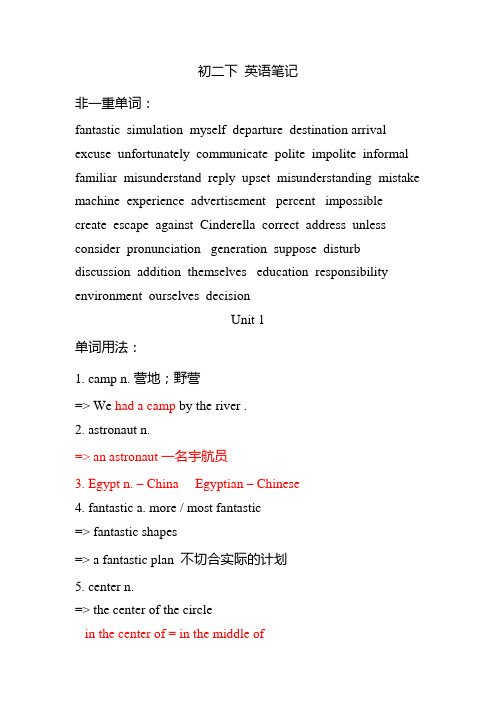
初二下英语笔记非一重单词:fantastic simulation myself departure destination arrival excuse unfortunately communicate polite impolite informal familiar misunderstand reply upset misunderstanding mistake machine experience advertisement percent impossible create escape against Cinderella correct address unless consider pronunciation generation suppose disturb discussion addition themselves education responsibility environment ourselves decisionUnit 1单词用法:1. camp n. 营地;野营=> We had a camp by the river .2. astronaut n.=> an astronaut 一名宇航员3. Egypt n. – China Egyptian – Chinese4. fantastic a. more / most fantastic=> fantastic shapes=> a fantastic plan 不切合实际的计划5. center n.=> the center of the circlein the center of = in the middle of6. training n. train v. 训练v. train sb to do sth 训练某人做某事=> He trained the parrot to talk .trainer n. 训练者 trainee n. 受训者7. course n. 大学的课程 subject n. 学科=> take a course8. diary n. diaries=> write / keep a diary 写日记=> in the diary 在日记中9. basic a. basically ad.=> basic training 基础训练10. opposite=> on the opposite side of the street 在道对面 a.=> I thought quite the opposite . n. 相反的事情=> The store is opposite the station . prep.商店在车站的对面 opposite = across from= The store is across from the station .=> A is opposite B .= A is across from B .= A is on the opposite side of B .11. simulation n. simulate v. 模仿 simulator n. 模拟装置12. shortly ad. = soon=> He will be back shortly / soon.shortly after = soon after 不久后13. spacewalk n.=>do a spacewalk 进行一次太空漫步14. myself yourself himself herself itselfourselves yourselves themselves 都是二重15. island n. an island16. whole a. n.a. (要放在定冠词,形物,所有格之后,单数名词之前) => the whole world=> his whole family=> the whole time = all the timeall + n.(pl.)=> All the dogs have long ears . 特指(这些狗…)=> All dogs have smart ears . (所有的狗…)all + n.u.=> all water / all the watern. whole=> the whole of his moneyall的用法:(1)可以修饰可数及不可数名词(2)修饰可数名词复数时:a. 名词前带the , these 等,表示所谈的是特定的事物=> All the dogs have long ears . 这些狗…=> All dogs have keen ears . 所有的狗…但n.前的数词时,the 可省=> All (the) five boys were late .(3) 有时直接修饰表示时间的单数名词=> all day / night / week / summer但是all hour / century 不可以17. real a. really ad. : 客观存在的,不是想象的true a. truly ad. truth n. :与实际相符的=> He is a real Party member , but he isn‟t a true Party member .Lesson 11. winter space camp 太空冬令营2. during summer vacation 在暑假期间3. live near the beach 住在海边附近4. visit vt + sb. / sp. = pay a visit to sb. / sp.travel to sp.5. people say = it is said 据说6. look forward to doing sth 盼望做某事=> I am looking forward to seeing you .7. plan v. planned plan to do sthn. make a plan for8. two weeks = half a month9. sound + a. sound like + n.=> That sounds like fun . fun nu10. come with me 和我一起来11. another day 改天Lesson 21. What‟s your job ?= What are you ?= What do you do ?= What do you do for a living ?2. Where does he travel ?= Which place does he travel to ?3. wear 状态 put on 动作 in + color dress + sb4. in space5. move around 到处移动6. on the ground 在地面上 in the ground 在地里7. joina. 加入带有政治色彩的组织=> join the Partyb. 加入某人=> join sbc. 成为其中一员=> join the clubjoin in / take part in / be in / participate in + 活动8. the world‟s largest space museum= the largest space museum in the world / around the world / all over the world / throughout the world9. take a training course 参加了一项训练课程10. excited a. exciting a. excite v. excitement n.be excited at / about / to do / that=> I am excited to hear the news .= I am excited about the news .11. learn about = know about 了解12. at first 首先 = in the beginning13. through the air 在气体中14. go forward 向前移动15. push off 推开语法:并列连词并列连词:连接具有并列关系的词,短语或句子的连词,叫并列连词。
EEC八年级下英语Unit_1_Lesson_one

After that ,he said some magic words. :”Abracadabra”.
To finish, he pulled a rabbit out of his hat.
Everyone in the audience is applauding.
The audience is /are very excited.
Listen again and write the missing words.
Liu Chang: Hey there, Amy. Watch this! I will _____ you a magic trick. Amy: OK. I’d like to _____ it. Liu Chang: Please watch carefully. To start _____, I take off my hat. I ____ it with my wand. After that, I say some _____ words, “Abracadabra.” Amy: And? Liu Chang: To _____, I pull some flowers out of my hat. Ta dah! Amy: Wow! That was _______, Liu Chang. How did you do that? Liu Chang: I _____ it from Merlin the magician. He’s a famous magician. Amy: Can you teach me, too?
taught a magic trick.
pulled flowers out of a hat.
wants to learn a magic trick.
初中EEC教材八年下知识点 5 单元 Microsoft Word 文档
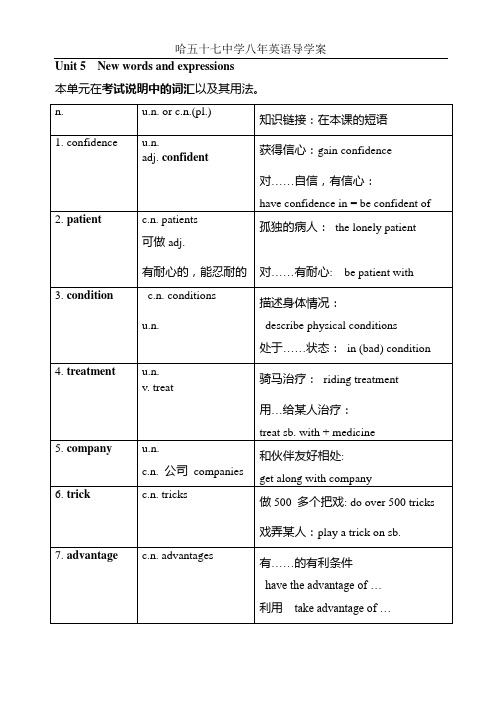
Unit 5 New words and expressions本单元在考试说明中的词汇以及其用法。
n. u.n. or c.n.(pl.) 知识链接:在本课的短语1. confidence u.n.adj. confident 获得信心:gain confidence 对……自信,有信心:have confidence in = be confident of2. patient c.n. patients可做adj.有耐心的,能忍耐的孤独的病人:the lonely patient 对……有耐心: be patient with3. condition c.n. conditionsu.n. 描述身体情况:describe physical conditions处于……状态:in (bad) condition4. treatment u.n.v. treat 骑马治疗:riding treatment 用…给某人治疗:treat sb. with + medicine5. company u.n.c.n. 公司companies 和伙伴友好相处:get along with company6. trick c.n. tricks 做500 多个把戏: do over 500 tricks戏弄某人:play a trick on sb.7. advantage c.n. advantages 有……的有利条件have the advantage of …利用take advantage of …8. sadness u.n.adj. sadadv. sadly 克服悲伤: overcome one’s sadness 遗憾的是……:It is sad that …9. passenger c.n. passengers 残疾的乘客: the disables passengers v. 动词单三,现在分词,过去式,过去分词知识链接:在本课的短语10. control controls, controlling,controlled, controlled也可用作n. 更好地控制他的腿:control his legs better自控:control oneself管理,控制: be in control无法管理,失去控制: be out of control 处于控制之下: be under control11. stretch stretches, stretching,stretched, stretched 伸展你的手臂肌肉:stretch your arm muscles伸手到桌子那头去拿果汁: stretch across the table for the juiceadj. 词形变化知识链接:在本课的短语12. hunting c.n.hunter猎人v. hunt 打猎一条来自美国的猎狗:a hunting dog from the U.S.A.13. well-known同义词:known, famous 众所周知:It is well-known that …因……而出:be well-know for作为……而著名:be well-know as 被某人熟知:be well-know to sb.14. homeless n./adv. home 邀请无家可归的孩子们参观他们的动物农场:invite homeless children tovisit their animal farm本单元的其他词汇以及用法。
EEC八年下英语单词
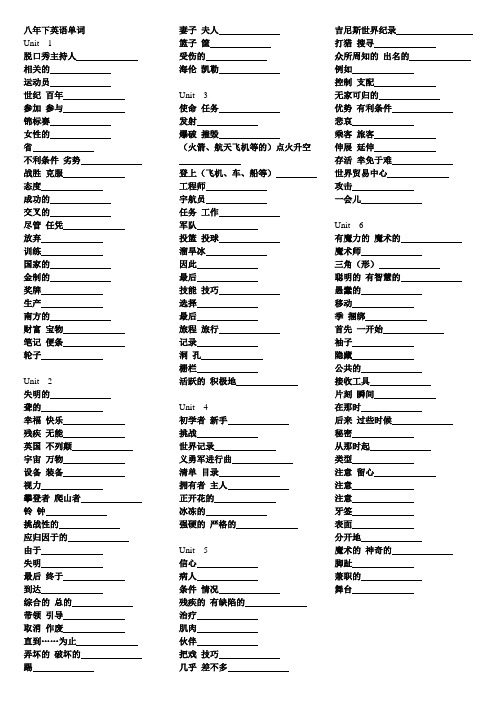
八年下英语单词Unit 1脱口秀主持人相关的运动员世纪百年参加参与锦标赛女性的省不利条件劣势战胜克服态度成功的交叉的尽管任凭放弃训练国家的金制的奖牌生产南方的财富宝物笔记便条轮子Unit 2失明的聋的幸福快乐残疾无能英国不列颠宇宙万物设备装备视力攀登者爬山者铃钟挑战性的应归因于的由于失明最后终于到达综合的总的带领引导取消作废直到……为止弄坏的破坏的踢妻子夫人篮子筐受伤的海伦凯勒Unit 3使命任务发射爆破摧毁(火箭、航天飞机等的)点火升空登上(飞机、车、船等)工程师宇航员任务工作军队投篮投球溜旱冰因此最后技能技巧选择最后旅程旅行记录洞孔栅栏活跃的积极地Unit 4初学者新手挑战世界记录义勇军进行曲清单目录拥有者主人正开花的冰冻的强硬的严格的Unit 5信心病人条件情况残疾的有缺陷的治疗肌肉伙伴把戏技巧几乎差不多吉尼斯世界纪录打猎搜寻众所周知的出名的例如控制支配无家可归的优势有利条件悲哀乘客旅客伸展延伸存活幸免于难世界贸易中心攻击一会儿Unit 6有魔力的魔术的魔术师三角(形)聪明的有智慧的愚蠢的移动季捆绑首先一开始袖子隐藏公共的接收工具片刻瞬间在那时后来过些时候秘密从那时起类型注意留心注意注意牙签表面分开地魔术的神奇的脚趾兼职的舞台八年下英语单词Unit 7姜芦荟治疗大量充足咳嗽谚语俗语格言糟糕的可怕的血切碎的好奇地未煮过的生的从现在起今后预防防止使敬畏使惊惧通知告诉公平的在户内想象力肥胖的西兰花维生素危险风险豆子蘑菇Unit 8医疗的医学的医药的失踪的丢失的八年下英语单词Unit 9幼儿园建筑师警察尽管当今天赋才能社会的社交的位置地位选择重视价值预言预报帐账目把……考虑在内轻率地仓促地后悔社会影响英国导演主管熄灭树枝分支果窝实现经理管理者Unit 10药片药丸潜水艇不同意指纹拇指取代替换愚蠢的接收接管学问知识现代的处理治疗治愈生活方式科技管理经营交通阻塞暴力暴行拜脱除去运输Unit 11命运太空外层空间战斗力量武力小说人物角色(总称)人类政府危险在危险中位于内疚的有罪的商人猿人猿星球(书名)出版发行Unit 12德国生物学邮箱地理(学)生气的发疯的旅游者绅士先生。
新目标英语八年级Go for it下册1-5单元 (Units 1-5课文 翻译)
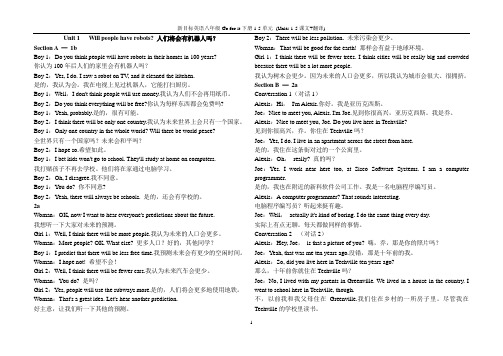
Unit 1 Will people have robots? 人们将会有机器人吗?Section A —1bBoy 1:Do you think people will have robots in their homes in 100 years?你认为100年后人们的家里会有机器人吗?Boy 2:Yes, I do. I saw a robot on TV, and it cleaned the kitchen.是的,我认为会。
我在电视上见过机器人,它能打扫厨房。
Boy 1:Well,I don't think people will use money.我认为人们不会再用纸币。
Boy 2:Do you think everything will be free?你认为每样东西都会免费吗?Boy 1:Yeah, probably.是的,很有可能。
Boy 2:I think there will be only one country.我认为未来世界上会只有一个国家。
Boy 1:Only one country in the whole world? Will there be world peace?全世界只有一个国家吗?未来会和平吗?Boy 2:I hope so.希望如此。
Boy 1:I bet kids won't go to school. They'll study at home on computers.我打赌孩子不再去学校。
他们将在家通过电脑学习。
Boy 2:Oh, I disagree.我不同意。
Boy 1:You do? 你不同意?Boy 2:Yeah, there will always be schools. 是的,还会有学校的。
2aWoman:OK, now I want to hear everyone's predictions about the future.我想听一下大家对未来的预测。
人教版八年级下册英语黑体单词(UNIT1-UNIT5)
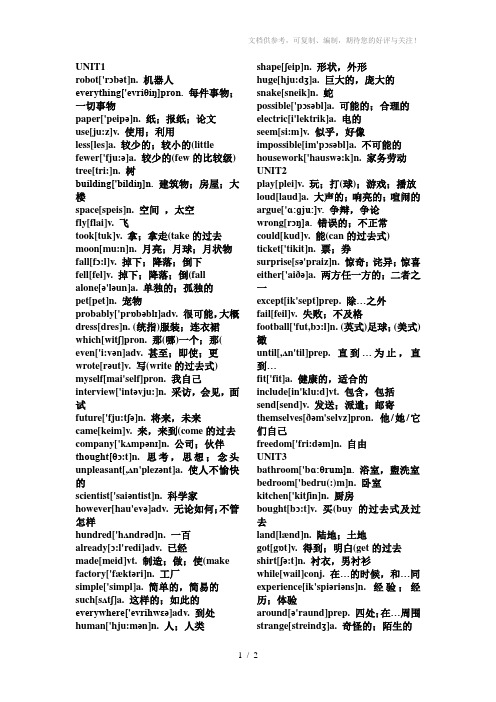
UNIT1robot['rɔbət]n. 机器人everything['evriθiŋ]pron. 每件事物;一切事物paper['peipə]n. 纸;报纸;论文use[ju:z]v. 使用;利用less[les]a. 较少的;较小的(little fewer['fju:ə]a. 较少的(few的比较级) tree[tri:]n. 树building['bildiŋ]n. 建筑物;房屋;大楼space[speis]n. 空间,太空fly[flai]v. 飞took[tuk]v. 拿;拿走(take的过去moon[mu:n]n. 月亮;月球;月状物fall[fɔ:l]v. 掉下;降落;倒下fell[fel]v. 掉下;降落;倒(fallalone[ə'ləun]a. 单独的;孤独的pet[pet]n. 宠物probably['prɒbəblɪ]adv. 很可能,大概dress[dres]n. (统指)服装;连衣裙which[witʃ]pron. 那(哪)一个;那( even['i:vən]adv. 甚至;即使;更wrote[rəut]v. 写(write的过去式) myself[mai'self]pron. 我自己interview['intəvju:]n. 采访,会见,面试future['fju:tʃə]n. 将来,未来came[keim]v. 来,来到(come的过去company['kʌmpənɪ]n. 公司;伙伴thought[θɔ:t]n. 思考,思想;念头unpleasant[,ʌn'plezənt]a. 使人不愉快的scientist['saiəntist]n. 科学家however[hau'evə]adv. 无论如何;不管怎样hundred['hʌndrəd]n. 一百already[ɔ:l'redi]adv. 已经made[meid]vt. 制造;做;使(make factory['fæktəri]n. 工厂simple['simpl]a. 简单的,简易的such[sʌtʃ]a. 这样的;如此的everywhere['evrihwεə]adv. 到处human['hju:mən]n. 人;人类shape[ʃeip]n. 形状,外形huge[hju:dʒ]a. 巨大的,庞大的snake[sneik]n. 蛇possible['pɔsəbl]a. 可能的;合理的electric[i'lektrik]a. 电的seem[si:m]v. 似乎,好像impossible[im'pɔsəbl]a. 不可能的housework['hauswə:k]n. 家务劳动UNIT2play[plei]v. 玩;打(球);游戏;播放loud[laud]a. 大声的;响亮的;喧闹的argue['ɑ:ɡju:]v. 争辩,争论wrong[rɔŋ]a. 错误的;不正常could[kud]v. 能(can的过去式) ticket['tikit]n. 票;券surprise[sə'praiz]n. 惊奇;诧异;惊喜either['aiðə]a. 两方任一方的;二者之一except[ik'sept]prep. 除…之外fail[feil]v. 失败;不及格football['fut,bɔ:l]n. (英式)足球;(美式)橄until[,ʌn'til]prep. 直到…为止,直到…fit['fit]a. 健康的,适合的include[in'klu:d]vt. 包含,包括send[send]v. 发送;派遣;邮寄themselves[ðəm'selvz]pron. 他/她/它们自己freedom['fri:dəm]n. 自由UNIT3bathroom['bɑ:θrum]n. 浴室,盥洗室bedroom['bedru(:)m]n. 卧室kitchen['kitʃin]n. 厨房bought[bɔ:t]v. 买(buy的过去式及过去land[lænd]n. 陆地;土地got[gɒt]v. 得到;明白(get的过去shirt[ʃə:t]n. 衬衣,男衬衫while[wail]conj. 在…的时候,和…同experience[ik'spiəriəns]n. 经验;经历;体验around[ə'raund]prep. 四处;在…周围strange[streindʒ]a. 奇怪的;陌生的follow['fɔləu]v. 跟随;遵循;追求amazing[ə'meiziŋ]a. 令人惊异的kid[kid]n. 小孩climb[klaɪm]v. 爬,攀登jump[dʒʌmp]v. 跳跃shout[ʃaut]v. 呼喊;喊叫;大声说rode[rəud]v. 骑(ride的过去式)cat[kæt]n. 猫ran[ræn]v. 跑(run的过去式) anywhere['enihwεə]adv. 在任何地方;无论何处met[met]v. 遇见(meet的过去式及happen['hæpən]vi. 发生;碰巧;偶然遇到accident['æksidənt]n. 事故,意外的事plane[plein]n. 飞机heard[hə:d]v. 听见(hear的过去式modern['mɔdən]a. 现代的;时髦的kill[kil]v. 杀死,弄死murder['mə:də]v. 谋杀bright[brait]a. 明亮的;聪明的playground['pleiɡraund]n. 操场,运动场bell[bel]n. 钟,铃;钟(铃)声;钟形rang[ræŋ]v. (钟、铃等)响(ringtold[təuld]vt. 告诉(tell的过去式close[kləʊs]v. 关,关闭silence['sailəns]n. 安静,沉默meaning['mi:niŋ]n. 意思;意义became[bi'keim]v. 变得(become的过去earth[ə:θ]n. 地球;土,泥;大地hero['hiərəu]n. 英雄;男主角flew[flu:]v. 飞,飞翔(fly的过去式UNIT4ever['evə]adv. 曾经message['mesidʒ]n. 消息,音信;留言suppose[sə'pəuz]vt. 猜想,假定,料想nervous['nə:vəs]a. 紧张不安的worse[wə:s]a. bad的最高级true[tru:]a. 真的,真实的;正确lucky['lʌki]a. 幸运的copy['kɒpɪ]v. 复制;复印;抄袭own[əun]v. 拥有village['vilidʒ]n. 村庄,乡村area['εəriə]n. 面积;区域;范围meter[mi:tə]n. 米,公尺thin[θin]a. 薄的;瘦的;稀的ate[et]v. 吃(eat的过去式)decision[di'siʒən]n. 决定;决心husband['hʌzbənd]n. 丈夫start[stɑ:t]v. 开始;启动;出发influence['influəns]n. 影响;有影响的人或事hometown['həum'taun]n. 故乡danger['deindʒə]n. 危险UNIT5flower['flauə]n. 花against[əˈɡenst]prep. 反对;挨着,靠着chance[tʃɑ:ns]n. 机会;可能性tonight[tə'nait]adv. 在今晚mobile phone['məubail fəun]n. 手提电话,手机。
初二(下)英语单词学习EEC教材unit1--5

The policeman sent the thief fleeing.警察的来到使小偷逃了。
Send for the doctor, please.请叫医生来。
Many countries have sent up man-made satellites.许多国家已发射了人造卫星。
5与each呼应的人称代词一般为he/him/his,也可用they/ them/their。Each has his own shortcomings.每个人都有不足之处。They each have their own seats.他们每个人都有自己的座位。
He joined two blocks of wood with glue.他用胶水把两块木头粘合起来。
用法:join作“连接”解释时,可用作及物动词,这时主语多为人,宾语是“被连接”的两个客体,也可以其中一个客体作宾语,而以to引出第二客体,连接的方法、手段或用具则可用by或with引出。偶尔也以物(多为河流、山川、道路、桥梁等人力所不能支配者)作主语,这时join还可表示“与……会合;与……交接”。join做“连接”解释时,也可作不及物动词,这时主语多为复数名词或以and连接的两个名词。
join用作及物动词时还可表示“使结合,使联合”,这时多以宾语sb为第一客体,而以with或to引出第二客体。join做“参加”解释时,还可用作不及物动词,主要和介词in连用。
join是瞬间动词,不能与表示一段时间的状语连用。
辨异:join in和take part in都可作“参加某项活动”解释。他们的区别是:
There is a lady ( who ) wants to see you.有一位女士要见你。
八年级(下)英语 Units 1-5知识点
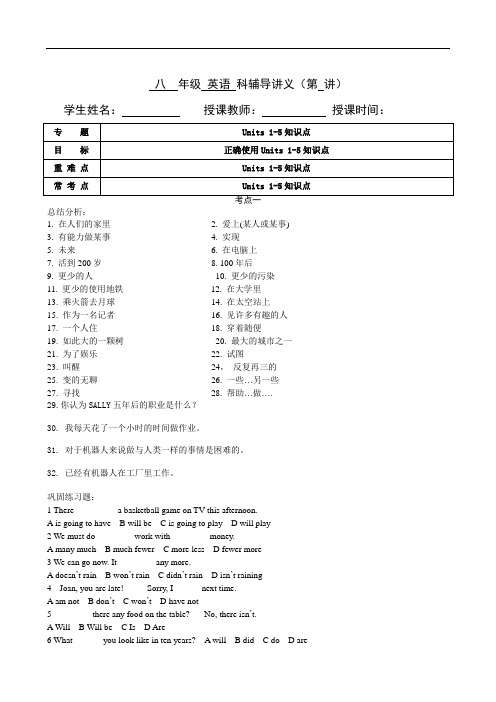
八年级英语科辅导讲义(第讲)学生姓名:授课教师:授课时间:总结分析:1. 在人们的家里2. 爱上(某人或某事)3. 有能力做某事4. 实现5. 未来6. 在电脑上7. 活到200岁8. 100年后9. 更少的人10. 更少的污染11. 更少的使用地铁12. 在大学里13. 乘火箭去月球14. 在太空站上15. 作为一名记者16. 见许多有趣的人17. 一个人住18. 穿着随便19. 如此大的一颗树20. 最大的城市之一21. 为了娱乐22. 试图23. 叫醒24,反复再三的25. 变的无聊26. 一些…另一些27. 寻找28. 帮助…做….29.你认为SALLY五年后的职业是什么?30. 我每天花了一个小时的时间做作业。
31. 对于机器人来说做与人类一样的事情是困难的。
32. 已经有机器人在工厂里工作。
巩固练习题:1 There _________ a basketball game on TV this afternoon.A is going to haveB will beC is going to playD will play2 We must do ________ work with ________ money.A many muchB much fewerC more lessD fewer more3 We can go now. It ________ any more.A doesn’t rainB won’t rainC didn’t rainD isn’t raining4 --Joan, you are late! --Sorry, I______ next time.A am notB don’tC won’tD have not5 --_______ there any food on the table? --No, there isn’t.A WillB Will beC IsD Are6 What ______ you look like in ten years? A will B did C do D are7 The students in our school learn English ______ computers. A at B in C on D to8 Peter ______ guitar yesterday afternoon. A plays B played C will play D played the9 _______ , people didn’t have computers.A Hundreds of years agoB In hundreds of yearsC Two hundreds years agoD Hundred of years ago10 ________ the future can be difficult. A Predict B Predicts C Predicting D Predicted1. I want to have a r______________ to do homework for me.2. I wrote a letter on a piece of p______________.3. There are lots of new b__________near our school.4. We planted three apple t___________ in front of our house.5. The air p_______________ is more and more serious in this area.6. Man- made satellites have been sent up into s___________ by many countries.7. They have many p_________, including three cats.8. Your son is ole enough to d______________himself.9. Leaves begin to f_________ in October.10. I will f_____________ rockets to the moon when I grow up.11. My parents are f___________workers.12. Such a toy is _____________ (简单的)to make.13. My father hates doing the ___________(家务事)and he thinks it’s an u__________job.14. She spent a ________________(巨大)amount of money on that coat.15. ___________(如此)accidents should not happen again.考点二总结分析:1. 想要…做…2. 呆在家里3. 播放CD 太大声4. 足够的钱5. 与…吵架6. 不时髦7. 写信给…8. 打电话给…9. 一张球赛的票10. 不让…进入11. 用电话交谈12. 怎么了?13. 令他感到惊讶的14. 付款15. 兼职工作16. 向你兄弟借些钱17. 向你父母要些钱18. 时髦的19. 需要帮助20. 查明21. 每个人除了我22. 年龄一样大23. 与…友好相处24. 与…打架25. 一些建议26. 足够忙碌27. 快速吃早餐28. 找到时间(做某事)29.尽可能……30. 各种各样31. (在)一方面32. (在)另一方面33.压力太大34. 抱怨…35. 参加36. 各种各样37. 与…比较38. 劳累的孩子直到7点才回家.39. 孩子们可能发现为自己计划事情很难.巩固练习题:( ) 1. My sister’s T-shirt is out of style. _________ needs to buy a new one.A. HeB. SheC. HisD. Her( ) 2. —_________ you pass me the book? I’d like to read it.—No problem. Here you are.A. NeedB. CouldC. MustD. Should ( ) 3. There isn’t enough place in the room, it isn’t _________ to hold these people.A. enough bigB. enough smallC. big enoughD. small enough ( ) 4. They are good friends, but sometimes they argue _________ each other.A. forB. toC. aboutD. with( ) 5. I am not good at English, and Ann isn’t, _________.A. tooB. alsoC. as wellD. either( ) 6. I tried the dress but it didn’t _________ me.A. fitB. getC. matchD. keep( ) 7. —I can’t find him. What should I do?—Maybe you should _________.A. call up himB. keep out himC. call him upD. keep him out ( ) 8. —What a beautiful sweater! How much did you _________ for it?—198 yuan.A. takeB. costC. payD. spend( ) 9. —Must I clean the blackboard now?—No, you _________.A. needB. needn’tC. couldn’tD. shouldn’t ( ) 10. We saw his sister _________ here at that moment.A. playsB. playedC. playingD. to play ( ) 11. —It seems that today is ______ yesterday.—Yes, you should wear a warm coat.A. as hot asB. as cold asC. so hot asD. so cold as ( ) 12. Everyone went to the museum _________ Jim. He had to stay at home.A. exceptB. besidesC. aboutD. with( ) 13. The policeman told the little boy _________ football in the street. It’s dangerous.A. not playB. not playingC. not to playD. not to playing ( ) 14. I don’t know when we will _________ home.A. return back toB. return toC. returnD. return back ( ) 15 Did you find _________ very interesting to play Yo-Yo?A. thisB. itC. usD. that( ) 16. —We can use QQ to talk with each other on the Internet.—Really? Will you please show me _________?A. what to useB. how to use itC. how can I use itD. what can I use ( ) 17. She looked _________ when she heard the _________ news.A. surprised; surprisingB. surprising; surprisedC. surprising; surprisingD. surprised; surprised( ) 18. —I had a fight with my brother this morning. —_________A. That’s nothing.B. Great!1. Tom p___________his CDs too loud.2. Mary a_____________with me yesterday.3. Who will pay for the t___________to the football match tonight?4. The news s_______________us last week.5. We c_________ask the teacher for help.6. This is an _____________idea.(新颖的)7. He looks younger after the ____________.(理发)8. Why are you _______________?(沮丧)9. We go there every day ________________Sunday.(除了)10.Her hat is in ________________.(流行款式)11. Don’t forget to r___________my book tomorrow.12.He likes playing f___________very much.13. The trousers f___________me very well.14. The rebels (反对者)fought for f____________.15. Please p__________the door and come in.考点三总结分析:1. 出去,离开2. 在…的前面3. 在理发店里4. 在理发店的椅子上5. 电话上聊天6. 沿着街道往下走7. 看见外星人出来8. 报警9. 打电话给电视台10. 起飞11. 一次不寻常的经历12. 正在我的前面着陆13. 对…感到惊讶地14. 跳下15. 一只猫在树上16. 照相17. 逃跑18. 太拥挤19. 另外一只狗20. 绕着车站四处走走21. 在…的隔壁22. 住院23. 例如24. 听说25. 寂静地26. 对大部分的美国人来说都有意义的27. 并非所有的28. 在太空里29. 持续大约22个小时30. 在月球上走巩固练习题:( )1. 1. What ______ you _______ when she came in?A. did, doB. are, doingC. do, doD. were, doing ( )2. Where was Davy ______ Linda was looking for him?A. thatB. whileC. atD. where( )3. The woman couldn’t see her son ________. She’s very worried.A. anywhereB. somewhereC. nowhereD. where( )4. We were very ________ that Jim didn’t pass the exam.A. surpriseB. surprisingC. surprisedD. surprises( )5. There’s a big tree _______ the building.A. in front ofB. in the front ofC. in frontD. at the front of( )6. When I came into the bank, the clerk ______the phone.A. talked withB. talked onC. was talking onD. was talking in ( )7. Do you know ______?A. what he happenedB. what the matter is with himC. what happened to himD. what did he happened( )8. The bell rang while Ann ________ her purse in the classroom.A. was looking forB. looked forC. is looking forD. looks for ( )9. ______they______, their classmates were all in the classroom.A. Before; were arguingB. When; are arguingC. While; were arguingD. While; are arguing( )10. .The thief ______when he saw someone find him.A. run awayB. ran awayC. is running awayD. was running away ( )11. These funny stories______ all the people in the train laugh.A. gotB. madeC. broughtD. grew( )12. – The plane will ________ soon. Would you please drive more quickly? -- OK!A. take awayB. take offC. take downD. take out( )13. ---Dad, will you buy me a new computer? ---I don’t know> I’ll have to ______ it.A. think ofB. think forC. think aboutD. think out( )14. The woman c ouldn’t see her son _____. She’s very worried.A. anywhereB. somewhereC. nowhereD. where( )15. I want to know if he _______ this afternoon. If he _______, I’ll meet him at the bus station.A. will come; will comeB. will come; comesC. comes; will comeD. comes; comes1. What were you doing when the UFO (到达)________________?2. The plane (降落)________________ at the right time.3. My purse is missing. I can’t find it (任何地方)__________________.4. I’m very (惊奇)______________ to see the strange man.5. The cat is very good at (爬)____________ the tree.6. Why are you so dirty? Go to the b __________ and wash yourself.7. I don’ t want to f __________ in the test.8. The boy was s_____________ when he saw the alien.9. Last Monday he was walking along the street. Just then a traffic accident h_______________.10. I was c_____________ my hair when the strange man passed the door.考点四总结分析:1. 为她举行一个惊喜晚会2. 生…的气3. 不再4. 首先5. 传递6. 被期望/应该7. 善长 8. 感冒9. 健康 10. 期末考11. 收到成绩单 12. 做…遇到困难13. 做…感到惊讶 14. 在历史上15. 抄我的作业 16. 克服它17. 听起来像 18. 改变生活19. 作为一名志愿者 20. 在为期一年的项目中21. 在生活中给他们一个好的开始22. 成为孩子的生活有一个好的影响23.我发现科学真的很难.24.爸爸妈妈向你们问好.25.对她来说学英语是一个好主意.26. 在你们与他们之间没什么不同.27.我能开阔学生对外面世界的视野.巩固练习题:( )1. ---The earth goes round the sun. --- What did he say? I couldn’t hear him. --- ____.A. He says the earth goes round the sun.B. He said the earth goes round the sun.C: He said the earth went round the sun. D. He says the earth went round the sun.( )2.The box is to . A. big enough, put my shoes B. enough big, put my shoes inC. big enough, put my shoes in D .big, put shoes in( )3.She told us she liked piano. A .to play B .playing the C. to play a D. playing a ( )4.The doctor after he the patient.A looked worrying , looked over B. seemed like worried ; looked afterC. looked worryed , looked afterD. seemed worried; looked over( )5.He thinks his sister can do very well in the exams, ?A. does heB. doesn’t heC. can’t sheD. can she( )6.The are buying some in the supermarket.A.woman teachers, tomatoesB.woman teachers, tomatosC.women teachers, tomatosD.women teachers, tomatoes( )7. Tom says he_____ wash hands before a meal. A. must to B. will has to C. has to D. have to ( )8.They_____ to visit our school the day after tomorrow. A. come ing C.are coming D.shall come ( )9. When you come here this afternoon. Please_____ your sister_____ you.A. take, withB. carry, withC. bring, withD. bring, to( )10. I’m afraid there_____ a heavy rain this afternoon. A. will be going to B. will C. will have D. will be ( )11._____ there was something wrong with the machine.A. There seemsB. It seemed thatC. He seemedD. It seem that( )12. I didn’t know she_______ play_______ guitar(吉他) when she was four.A. can, \B. could, theC. could,\D. can ,the( )13. Mother thought_______ a clever boy. A. he is B. him C. him was D. his( )14.Can you ______this word ______ English? A. say; in B. speak; in C. speak; with D. say; with ( )15.The rich men can buy_______ lots of things. A. himself B. him C. them D. themselves ( )16. Your answer _________ right. A. becomes B. seems C. hears D. listens( )17. Someone wants to talk to you _________ the phone. A. in B. into C. on D. with ( )18. I couldn't find my dictionary ______. A. somewhere B. anywhere C. nowhere D. everywhere ( )19. What____while Linda was on the telephone?A.happenedB.has happenedC.is going to happenD.is happening( )20. Beijing was made host to the 2008 Olympics. It was one of the most important _______ in Chinese history. A. things B. events C. activities D. accidents1.May I take a m________________?2.You are _____________(猜想)to leave at five.3.Don’t waste my time ________________(不再).4.Don’t be m___________at me.5.Would you please p______me a glass of water?6.I will study harder in this ____________(学期).7.The Chinese is a h_______ people(民族).8.I was quite ____________(紧张地)at that time.9.It is ___________(真实的)that they are married.10.I was e ______________enough to catch the last bus.11.You shouldn’t ___________(抄袭)others’ homework.12.She makes all her ________________(自己的)clothes.13.My family used to be________________(贫穷的).14.The ice on the pond is too ___________(稀薄的)for skating.15.Her _____________ (丈夫)is a policeman.考点五总结分析:1. 让你进去2. 迟到3. 玩得高兴4. 为考试而学习5. 组织聚会6. 班里一半的学生7. 穿牛仔裤 8. 学校聚会的规则9. 把它拿走 10. 请他们离开11. 上大学 12. 环游世界13. 挣很多钱 14. 接受教育15. 对于许多年轻人来说 16. 通过…来谋生17. 一直关注你 18. 受伤19. 假如你成为职业运动员,你将能做你喜欢的事情来谋生.20. 假如你有钱了,你要知道谁是你真正的朋友就很难.巩固练习题:( )1. If you are late for class, the teacher ______ angry.A. isB. wasC. willD. will be( )2. – Why not ________ a party tonight? -- Good idea.A. to haveB. havingC. hadD. have( )3. They live near the seaside, so most of them ______ by fishing.A. make friendsB. make a livingC. make foodD. make life ( )4. It’ s time for class. Please stop ______.A. talkB. talkingC. to talkD. talked( )5. My watch is broken. I want to know how to make it _________.A. workB. to workC. walkD. to walk( )6. -- I’m going to the school party. -- _______.A. Me, too.B. So am I.C. Me, neither.D. A &B( )7. This book isn’t useful. Please_____________.A. take part inB. take it awayC. take away itD. take out it ( )8.I am surprised ______ that you won’ t go to college.A. to hearingB. hearingC. hearD. to hear( )9. Class Two won the football match game, though half of them ______ during the match.A. get injuredB. injureC. were injuringD. got injured ( )10. I was doing the same job ________ and I really felt tired.A. all timeB. the all timeC. at timesD. all the time ( )11. Mr Smith always _________ weekends playing with his children.A. takesB. paysC. costD. spends( )12. If you wear jeans to the party, the teacher won’t ________ you _________.A. leave; inB. let; inC. leave; outD. let; out( )13. We’ll stay at home if it _______ tomorrow.A. rainB. rainsC. to rainD. will rain( )14. Lu Xun was famous _______a writer.A. forB. asC. ofD. with( )15. Don’t shout_______ the party. If you do, you’ll ________ leave.A. at; mustB. of; have toC. at; have toD. in; must1. My cousin is an (代理商) _________________ .2. I don’ t want to wear my (牛仔裤) ___________ .3. This is the most important (事件) ___________ of the year.4. I hope our football team will be (好运) __________ in Asia Cup.5. Did you (选择) ___________ the best one? We have no time.6. He had to work in a building-field to make a l_______________ .7. We can find the kind-hearted person e______________ .8. A famous person gave her much money to c___________________.9. Jack is an able person. He often o_______________ activities.10. At yesterday’s meeting Mr Wang was a________________ their decision.Everybody has one of those days when everything goes wrong. This is what happened to Harry.One morning, he got up very 1 because his clock stopped. He 2 to shave (刮脸) quickly and cut himself. When he got dressed, he got blood(血) all over his 3 , so he had to find another one. The only other shirt that was clean 4 ironing(烫). While he was ironing it, there was a knock at the door. It was the man to collect money for water. After he was paid the water 5 and showed the man out, he found the iron had burnt a hole in his shirt. So he had to wear the one with the blood on it after all. By this time it was very late, so he 6 he couldn’t go to work by bus. He 7 for a taxi to take him to work, the taxi arrived and 8 in.In another part of the town, a man killed a woman 9 a knife and was seen to run away in a taxi. When Harry’s taxi stopped outside his office, a policeman 10 to be standing there. He saw the blood on Harry’s shirt, and took him to the police station. He was 11 till 3 p.m.. 12 the police found out that he was not the man they wanted. When he finally arrived 13 the office at about 4 p.m., his boss 14 a look at him and told him to find 15 job.( )1. A. early B. late C. worried D. fast( )2. A. tried B. hoped C. wished D. wanted( )3. A. coat B. sweater C. jacket D. shirt( )4. A. need B. needed C. needing D. to need( )5. A. money B. change C. bill D. pay( )6. A. wondered B. thought C. believed D. decided( )7. A. looked B. wished C. waited D. telephoned( )8. A. got B. sat C. came D. entered( )9. A. by B. with C. in D. through( )10.A. seemed B. said C. happened D. appeared( )11.A. stopped B. caught C. left D. kept( )12.A. before B. after C. since D. while( )13.A. at B. in C. to D. from( )14.A. had B. gave C. showed D. has( )15.A. another B. the other C. other D. other’s( A )Dreams may be more important than sleep. Some people don’t need much sleep. But we all n eed to dream, scientists say.Dreams take up (占用) about one quarter of our sleeping time. People have several dreams each night. Dreams are like short films. They are usually in color. Some dreams are like old films. They come to us over andover again. That may be because the dreamer is worrying about something. Dreaming may be a way of trying to find an answer.Some people get new ideas about their work from dreams. They could have been thinking about their work all day. These thoughts can carry over into dreams.Sometimes we wake up with a good feeling from a dream. But often we can’t remember the dream. Dreams can disappear (消失) quickly from memory.Too much dreaming can be harmful(有害). The more we sleep, the longer we dream. The mind is hard at working when we dream. That is why we may have a long sleep and still wake up tired.( )1. It may be less important to sleep than to _______.A. thinkB. dreamC. workD. play( )2. Dreams and films are usually ______.A. very longB. in colorC. about workD. short( )3. The people often dream about their work because _______.A. they are tired in the daytimeB. they are not interested in their workC. they may be thinking about their work all dayD. they are too excited( )4. The main idea of the story is that _______.A. people need to dreamB. people like to sleepC. dreams are like films( )5. The title for the story could be ______.A. Terrible dreamsB. The longest sleepC. Dreams( B )What will you do if you get 5 million (百万)? Some people give some different answers.Sally: I want to do business (生意). If I am rich, I will do a lot of things for my family. For me nothing is more important than my family. I will buy a new house for them and travel around the world.Joe: If I have 5 million, I will use the money to do everything I like. At first, I will use 2 million to open my own shop. And I will use another 2 million to buy some new houses. In the future, the houses which I buy will become more expensive, and I will sell them to other people. Finally, I will use 1 million to buy some presents for my family and my best friend.Anna: If I have 5 million, I will put 3 million in the bank and spend 2 million. I will visit Paris, London and New York. I will eat delicious food, play games, and build a building with a swimming pool.Jack: I will buy an island if I have 5 million. Then I will be the king of the island and I will invite my friends to my island.( )6. Who will do business if he/she gets 5 million.A. Sally.B. jack.C. Anna.D. We don’t know..( )7. What will Anna do if she gets 5 million?A. Do business.B. Open a shop.C. Buy an island.D. Put three million in the bank and spend 2 million.( )8. What will Joe do with the last 1 million if he gets 5 million?A. He will buy some new houses.B. He will open his own shop.C. He will bur some presents for his family and his best friend.D. He will build a building.( )9. Where will Anna visit if she gets 5 million?A. China and Japan.B. London, Paris and New York.C. London, Paris and Belgium.D. Angola, Cuba and India.( )10. What does the passage talk about?A. If one loses money, what will she/he do?B. If one borrows 5 million, what will he/she do?C. If one gets 5 millions, what will he/she do?D. If one builds a big building, he/ she will sell it.CMr Clarke hated to do housework. He wouldn’t stay at home on weekends. His wife always told him to do some washing or cleaning, or he had to cook for his family. So he always made some excuses on Friday evenings.Recently(最近) Mr Clarke was interested in playing cards, but he was afraid to let his wife know. So every Sunday afternoon he brought some fish home. It made his wife happy and she never asked where he spent his weekends.One Saturday morning, Mr Clarke left home at 7 o’clock. He took a bus and got off at a stop near a small town. His friends were waiting for him in a small hotel. They played cards there. Mr Clarke didn’t go home until 7 o’clock on Sunday evening. He went in the shop near the bus stop as usual. As soon as the shopkeeper saw him, the man said, “I’m sorry, Mr Clarke. I have no fish today. What about some chicken legs?”“Don’t be silly(傻)!” said Mr Clarke, “I can’t tell my wife that I have fished some chicken legs, can I?”( )11. Mr Clarke didn’t want to stay at home on weekends because ______.A. he didn’t want to do any houseworkB. he didn’t love his wifeC. he was very busyD. he went to his parents’ house( )12. What was Mr. Clarke interested in recently?A. Fishing.B. Playing cards.C. Shopping.D. Doing housework.( )13. How long was Mr Clarke away from his home?A. About 24 hours.B. About 36 hours.C. About 48 hours.D. About 72 hours.( )14. Mr Clarke played cards with his friends __________.A. at homeB. in a shopC. in a hotelD. in his office( )15. Which of the following is NOT true according to the passage?A. Mr Clarke hardly stayed at home on weekends.B. Mr Clarke bought some fish in the shop that day.C. Mr Clarke never told his wife that he played cards.。
EEC初二(下)英语单词
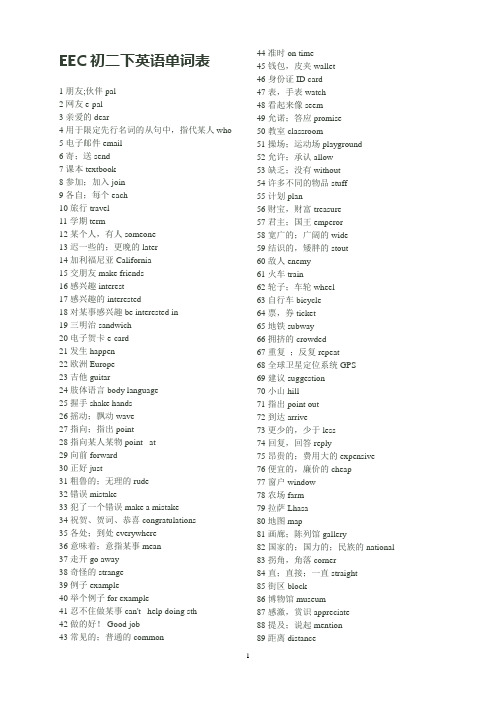
EEC初二下英语单词表1 朋友;伙伴 pal2 网友 e-pal3 亲爱的 dear4 用于限定先行名词的从句中,指代某人 who5 电子邮件 email6 寄;送 send7 课本 textbook8 参加;加入 join9 各自;每个 each10 旅行 travel11 学期 term12 某个人,有人 someone13 迟一些的;更晚的 later14 加利福尼亚 California15 交朋友 make friends16 感兴趣 interest17 感兴趣的 interested18 对某事感兴趣 be interested in19 三明治 sandwich20 电子贺卡 e-card21 发生 happen22 欧洲 Europe23 吉他 guitar24 肢体语言 body language25 握手 shake hands26 摇动;飘动 wave27 指向;指出 point28 指向某人某物 point at29 向前 forward30 正好 just31 粗鲁的;无理的 rude32 错误 mistake33 犯了一个错误 make a mistake34 祝贺、贺词、恭喜 congratulations35 各处;到处 everywhere36 意味着;意指某事 mean37 走开 go away38 奇怪的 strange39 例子 example40 举个例子 for example41 忍不住做某事 can't help doing sth42 做的好! Good job43 常见的;普通的 common 44 准时 on time45 钱包,皮夹 wallet46 身份证 ID card47 表,手表 watch48 看起来像 seem49 允诺;答应 promise50 教室 classroom51 操场;运动场 playground52 允许;承认 allow53 缺乏;没有 without54 许多不同的物品 stuff55 计划 plan56 财宝,财富 treasure57 君主;国王 emperor58 宽广的;广阔的 wide59 结识的,矮胖的 stout60 敌人 enemy61 火车 train62 轮子;车轮 wheel63 自行车 bicycle64 票,券 ticket65 地铁 subway66 拥挤的 crowded67 重复;反复 repeat68 全球卫星定位系统 GPS69 建议 suggestion70 小山 hill71 指出 point out72 到达 arrive73 更少的,少于 less74 回复,回答 reply75 昂贵的;费用大的 expensive76 便宜的,廉价的 cheap77 窗户 window78 农场 farm79 拉萨 Lhasa80 地图 map81 画廊;陈列馆 gallery82 国家的;国力的;民族的 national83 拐角,角落 corner84 直;直接;一直 straight85 街区 block86 博物馆 museum87 感激,赏识 appreciate88 提及;说起 mention89 距离 distance90 罗盘;指南针 compass91 设定;设置;摆设 set92 调表 set the clock93 方向;指导 direction94 跟随;跟着 follow95 方式;方法 method96 不幸地 unfortunately97 位置;职位 position98 清晰地;清澈地 clear99 假如 what if100 地球;土地 earth101 对…起作用 work for 102 车厢 car103 电话 phone104 画 painting105 政府 government106 携带,运送 carry107 超级市场 supermarket 108 配餐 side order109 咸肉,熏肉 bacon110 另外;其他 else111 烤薄饼 pancake112 烤面包片;土司面包 toast 113 可乐;可口可乐 Coke 114 付钱 pay115 公共卫生间 restroom116 纸 paper117 某处,在某处 somewhere 118 海洋 sea119 注意到 notice120 在...的时候 while121 某事,某物 something 122 女人 woman123 部分,零部件 part124 在……之上,越过 over 125 友好的 friendly126 主要地,大部分 mostly 127 悬挂 hang128 泰国人;泰国语 Thai 129 标记;符号,记号 sign 130 蒸的 steamed131 庆祝 celebrate132 爆竹,鞭炮 firecracker 133 羊毛 wool134 先生 Mr.135 夫人 Mrs. 136 女士 Ms.137 附言,补充说明 P.S.(postscript)138 然而,可是 however139 谁也不;无人 nobody140 顺着;沿着 along141 附带着 along with142 鞠躬;弯腰 bow143 因此;所以 therebore144 问候,向……致意 greet145 (复数)孙子,孙女 grandchildren 146 真相;真理 truth147 消息;讯息 message148 顺便问一下,顺便说一下 by the way 149 额外的 extra150 接近 close151 图书馆 library152 去钓鱼 go fishing153 不睡觉;熬夜 stay up154 今晚;今夜 tonight155 特别的;特殊的 special156 任何人 anyone157 自从,自…以来 since158 英国人;英国的 British159 运动鞋 trainer160 裤子(美) pants161 裤子(英) trousers162 油炸土豆片 crisp163 法国人;法国的 French164 薯条 French fries165 请求;祈求 beg166 原谅;宽恕 pardon167 公寓(美) apartment168 公寓(英) flat169 卡车(英) lorry170 拼写,拼读 spell171 大笑 laugh172 电影(英) film173 正确的 correct174 贫穷的 poor175 不同之处,不同点 difference176 在两者之间 etween and177 卡车(美) truck178 重音,口音;重音符 accent179 富有的 rich180 休息;静止 rest181 座位 seat182 为了……;以便于…… so that183 仍;至今 yet184 叠被,整理床铺 make the bed185 洗衣店,要洗的衣服;洗烫 laundry 186 扫 sweep187 垃圾 garbage188 收拾起来 put away189 应该必须 have to190 抽屉 drawer191 毯子 blanket192 依靠;依赖 depend193 依靠于…… depend on194 确定…… make sure195 既不……又不,两者都不 neither nor 196 摆摊子 set the table197 景点 spot198 理解;明白 understand199 枕头 pillow200 勺子 spoon201 必须;应当 must202 不准许 mustn't203 不必 don't have to204 护士 nurse。
新目标英语八年级Goforit下册1-5单元(Units1-5课文翻译)
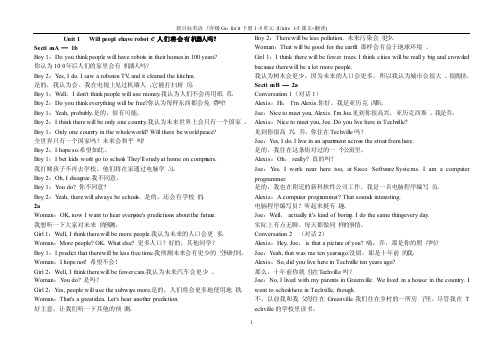
Unit 1 Will p eople have robots? 人们将会有机器人吗?Sectio n A —1bBoy 1:Do you thinkpeople will have robots in theirhomesin 100 years?你认为100年后人们的家里会有机器人吗?Boy 2:Y es, I do. I saw a roboton TV, and it cleane d the kitche n.是的,我认为会。
我在电视上见过机器人,它能打扫厨房。
Boy 1:Well,I don't thinkpeople will use money.我认为人们不会再用纸币。
Boy 2:Do you thinkeveryt hingwill be free?你认为每样东西都会免费吗?Boy 1:Y eah, probab ly.是的,很有可能。
Boy 2:I thinktherewill be only one countr y.我认为未来世界上会只有一个国家。
Boy 1:Only one countr y in the wholeworld? Will therebe worldpeace?全世界只有一个国家吗?未来会和平吗?Boy 2:I hope so.希望如此。
Boy 1:I bet kids won't go to school. They'll studyat home on comput ers.我打赌孩子不再去学校。
他们将在家通过电脑学习。
Boy 2:Oh, I disagr ee.我不同意。
Boy 1:Y ou do? 你不同意?Boy 2:Y eah, therewill always be school s. 是的,还会有学校的。
EEC初二下Unit5知识点讲解
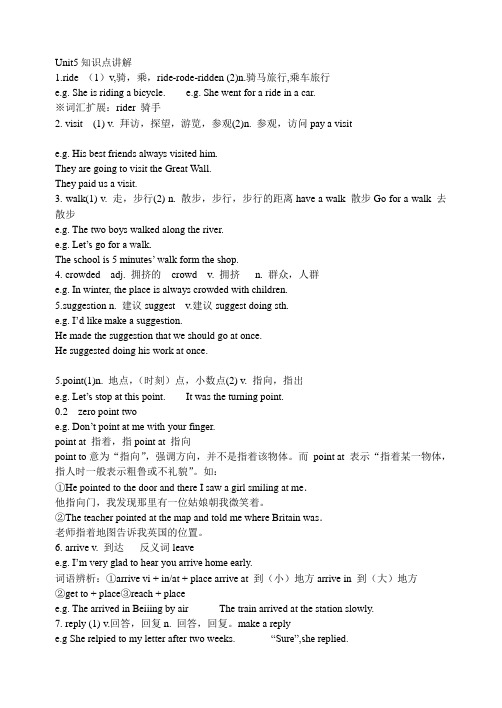
Unit5知识点讲解1.ride (1)v,骑,乘,ride-rode-ridden (2)n.骑马旅行,乘车旅行e.g. She is riding a bicycle. e.g. She went for a ride in a car.※词汇扩展:rider 骑手2. visit (1) v. 拜访,探望,游览,参观(2)n. 参观,访问pay a visite.g. His best friends always visited him.They are going to visit the Great Wall.They paid us a visit.3. walk(1) v. 走,步行(2) n. 散步,步行,步行的距离have a walk 散步Go for a walk 去散步e.g. The two boys walked along the river.e.g. Let’s go for a walk.The school is 5 minutes’ walk form the shop.4. crowded adj. 拥挤的crowd v. 拥挤n. 群众,人群e.g. In winter, the place is always crowded with children.5.suggestion n. 建议suggest v.建议suggest doing sth.e.g. I’d like make a suggestion.He made the suggestion that we should go at once.He suggested doing his work at once.5.point(1)n. 地点,(时刻)点,小数点(2) v. 指向,指出e.g. Let’s stop at this point.It was the turning point.0.2 zero point twoe.g. Don’t point at me with your finger.point at 指着,指point at 指向point to意为“指向”,强调方向,并不是指着该物体。
- 1、下载文档前请自行甄别文档内容的完整性,平台不提供额外的编辑、内容补充、找答案等附加服务。
- 2、"仅部分预览"的文档,不可在线预览部分如存在完整性等问题,可反馈申请退款(可完整预览的文档不适用该条件!)。
- 3、如文档侵犯您的权益,请联系客服反馈,我们会尽快为您处理(人工客服工作时间:9:00-18:30)。
Unit One 单元测试一、选择填空()1.—How often do you your friend? —Once a week.A. hear aboutB. hear ofC. hear from()2.—Do you know the boy America?—Y es, he is a friend of .A. is from, meB. come from, myC. from, mine()3.—Listen to me carefully. Can you me? —Y es, I can.A. listenB. soundC. hear()4.—When did your brother the army? —About two years ago.A. joinB. join inC. take part in()5.—What do you think of the student? —He seems .A. cleverB. to be cleverC. Both A and B()6.—Mike is always friendly others.—So he is. People like friends with him.A. for, makingB. to, makeC. to, making()7.—May I take your order?—Y es. I would like two and a glass of orange juice.A. sandwichB. pieces of sandwichC. sandwiches()8.—Don’t talk . —Sorry, I won’t do it again.A. in the classB. in classC. in a class()9.—What did your parents give you on New Y ear’s Day?—of us got a present.A. EveryB. EachC. Everyone()10.—Do you have any friends who playing computer games?—Y es. Most of them are good at computers.A. likeB. likesC. liking()11.—W ould you like to go shopping with me on Sunday afternoon? — .A. Y es, pleaseB. No, thanksC. Y es, I’d love to()12.—What happened just now? —A car accident happened him.A. onB. toC. in()13.—Where are they from? —They are from . They are .A. Germany, GermenB. German, GermanyC. Germany, Germans()14.—What kind of dumplings go you like?—I like dumplings meat in them.A. withB. haveC. has()15.—Please listen to the teacher as as you can. —Ok, I will.A. carefulB. carefullyC. the most carefully()16.—Do you know Jay zhou?—Y es. He is famous a singer and he is also famous his beautiful songs.A. for, asB. as, forC. to, as()17.—do you write your friend? —Once a week.A. How many, toB. How often, toC. How long, for()18.—seems that he will win the match.—I agree you.A. It, withB. He, toC. I, with()19.—Do you have in English? —Y es, I do.A. interestedB. interestsC. interest()20.—What do you want to at the meeting?—Something about my American e-pal.A. talkB. sayC. speak()21.—Tomorrow we will go shopping. Why not us? —Good idea.A. joinB. joiningC. to join()22.—What would you like to eat for supper?—I would like Chinese food, dumplings.A. traditionalB. traditionallyC. more traditional()23.—W ang Dandan, it is your turn the text. —OK.A. to reciteB. recitingC. to reciting()24.—What do you know about him?—He lives Taiwan his parents.A. at, withB. in, toC. in, with()25.—Does the earth go around the sun? — .A. That’s all rightB. All rightC. That’s right()26.—My father likes dumplings which meat in them. —So do I.A. hasB. haveC. having()27.—In the class meeting we how to learn English well.—I think it must be useful to you.A. talked aboutB. talked toC. talked with()28.—Who do you write e-mail ? —My e-pal, Jim.A. toB. forC. of()29.—I you to win the soccer game. —Thank you.A. hopeB. wishC. make()30.—Can you write an e-mail ? —Of course. Y ou know I am English.A. in England, well in B, in English, good at C. with English, interested in()31.His e-pal is an American girl, she likes China very much.A. eleven years oldB. seven-year-oldC. eight-year-old()32.This is an Sci-Fi movies(科幻电影). Children around the world are in it.A. interest, interestingB. interesting, interestedC. interested, interest()33.Paul seemed today because his best friend has gone to America.A. happyB. unhappyC. happily()34.Each of his e-pals him an e-card on his birthday.A. postB. writesC. sent()35.I have seen the student father a great scientist.A. whose, isB. who, wasC. whom, is()36.—Do you know that short boy?—Which one? Is it the one wears a pair of glass? He’s from America.A. whoB. whichC. whom()37.The young man is so cool. I hope to him.A. make friend withB. become friend withC. make friends with()38.—I that hobbies can help a person’s mental(精神的) and physical(身体的) health.—Y es. I also hobbies are important in helping patients recover(康复) form physical ormental illness.A. listen; hear forB. hear; hear aboutC. hears of; hear about()39.—Do you know Y u Dan who can speak Analects(《论语心得》)?—Of course. W e are best friends. Y esterday I her and she told me to study hard.A. heard ofB. heard aboutC. heard from()40.Liu Xiang looks so happy! He won the first place in 5th Asian Sports Games after being injured. He just now.A. bought a gift to his parentsB. Sent an e-card to his coachC. made a card to his girl friend()41.—Do you often see Tom on the playground?—No, but he is often seen to play Chinese kung fu in the park.A. runB. runningC. runs()42.As soon as you get full confidence(自信) in yourself and be sure to face any trouble. At that time you me and let me know.A. write toB. write forC. told()43.The 29th Olympic torch(奥运火炬) traveled 135 cities around the world. exciting the news was! And it arrived at the opening ceremony on August 8th, 2008.A. WhatB. HowC. What an()44.—I’m very in the comic skit(小品) in the CCTV3 special program for New Y ear’s Eve.—Y es, the phrases are so that all the audience are attracted.A. interesting; interestedB. interested; interestingC. interesting; interesting()45.Liu Xiang and Y ao Ming are world-famous sports stars. of them has set a good example to us.A. AllB. bothC. Each()46.The girls from Heilongjiang University are talking about the book Who Moved My Chinese in English. It’s fun to them.A. joinB. join inC. take part in()47.—Many sportsmen are getting ready for the 2008 Beijing Olympic Games.—Y es. They will some games.A. take part inB. goC. join()48.—Look! What are the farmers doing?—They are planting trees on side of the road.A. eachB. bothC. all()49.—He seemed because he left without saying goodbye to us.—What a pity!A. to be angryB. angryC. A and B()50.Harbin is really a beautiful city and there’re many places of interest. I more friends with the people in Harbin.A. wish makeB. hope to makeC. want make()51.—Can you say anything about your friend?—Of course. He is the boy who likes .A. playing guitarB. playing the guitarC. to play guitar()52.On sides of the street are a lot of colorful flowers. There will be an important meeting.A. eachB. bothC. either()53.Though the famous dancer, Tai Lihua, is deaf, she dances most of the people.A. as good asB. as well asC. best among()54.—How was the weather yesterday?—It was terrible, it rained . People could go out.A. hardly; hardlyB. hardly; hardC. hard; hardly()55.—Don’t you see John is there? — . Can you point him out from the students?A. Y es, I doB. No, I don’tC. Both A and B()56.—Aren’t you a teacher?— . Many people think so like you, but in fact I am a bus driver.A. Y es, I amB. Y es, I’m notC. No, I’m not ()57.—Don’t you like fruit?—, I usually eat fruit after meals every day.A. Y es, I doB. No, I don’tC. No, I do二、句型转换1.The boy likes science. He comes from Australia.(合并为一个复合句)The boy likes science from Australia.2.He’s writing a letter to his friend.(变为同义句)He’s writing friend.3.Amy heard about Zhang W ei’s e-pal.(对划线部分提问)did Amy about?4.He turned on the radio. He listened to the weather report.(合并为一个复合句)He turned on the radio to the weather report.5.It is great fun to have a picnic on the hillside.(变为感叹句)What it to have a picnic on the hillside!6.I won’t hear of such a thing.(同义句)I won’t such a thing.(同义句)7.Lucy heard from Jim yesterday. (同义句)Lucy Jim yesterday.8.They each want to go hiking this weekend. (同义句)to go hiking this weekend.9.Each of you passes the exam, congratulations. (同义句)the exam, congratulations.10.He seems interested in this story book. (同义句)①He seems in this story book.②he is interested in this story book.11.It seems snowy. (同义句)①It seems .②It seems that .12.My English teacher is from California. (同义句)My English teacher California.13.Each girl wants to be beautiful. (同义句)of the wants to be beautiful.14.Tom is interested in light music. (同义句)Light music is Tom.15.They seemed angry. (同义句)They seemed angry.16.I hope to make friends with him. (同义句)I look forward friends with him. 17.Each of us talked about someone in English. (同义句)talked about someone is English.18.I want to be your e-pal. (同义句)I to be your e-pa.19.My mother makes dumplings that have meat inside. (同义句)My mother makes dumplings that have meat . 20.My e-pal sent me an e-mail last night. (同义句)My e-pal sent e-mail me last night. 21.Where are you from? (同义句)W ere you from?22.His e-pal is from Canada, too. (同义句)His e-pal from Canada.23.Do you often receive a letter from your sister? (同义句)Do you often your sister?24.Jim is one of my friends. (同义句)Jim is a friend .25.Mary is interested in reading story books. (同义句)Mary in reading story books.26.The girl is eight years old. (同义句)She is girl.27.Each of us has an e-pal. (同义句)each an e-pal.28.I hope that I can travel around China one day. (同义句)I hope to travel China one day.29.She seems friendly to everyone. (同义句)She seems friendly to everyone.that she is friendly to everyone.三、交际运用1.补全对话A:Hi, Zhang W ei. What are you 1 ?B:I am 2 to my e-pal, Jane?A:Is she the 3 4 Canada?B:No, that’s W ang 5 e-pal.A:I am 6 in 7 an e-pal.B:Really? I’ll tell Jane. 8 she knows someone 9 wants one.A:Thanks!1.2.3.4.5.6.7.8.9.2.(A)从A~G选项中选出能填入空白处的最佳选取项对话。
